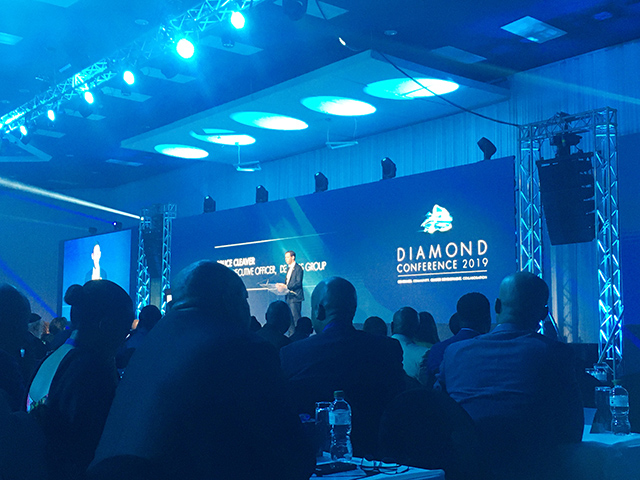SYNTHETIC diamonds will never outshine naturally unearthed diamonds, said mining giant De Beers chief executive officer, Bruce Cleaver.
Cleaver said this while responding to a question regarding the threat synthetic diamonds pose to the natural diamonds trade for De Beers at the 2019 diamond conference in Gaborone.
The annual conference, now on its fifth turn, is held in the diamond-rich Botswana every year, where diamond mining and trading stakeholders come together to discuss pressing issues around diamonds and cast predictions for the future of the diamond industry.
“De Beers is committed to natural diamond mining. We continue to promote and [stay] focused on our natural business and give our consumers what we think they want,” he said.
Adding that synthetic diamonds can be likened to technology, “production costs over time will become cheaper and [as] the prices of synthetic diamonds will come down, so will their value – this cannot be so for natural diamonds,” he said.
Cleaver said while De Beers also has a stake in the production of synthetic diamonds, they entered the sector only to capitalise on the opening in the synthetic diamonds market. Natural diamonds will, however, continue to be their primary trade.
The Namibian reported last month that Namibia and other global producers of natural diamonds can fend off competition from synthetic diamonds through differentiation and marketing of the natural stones.
Mines and energy minister Tom Alweendo last month said while it is true that both natural and synthetic diamonds are deemed consumable products, producers of natural diamonds would do well to educate consumers on the unique value of their stones and thus make an impactful difference.
“What should worry us is only if the consumers start confusing the lab-grown stone and the natural stones. But if you buy knowing that it is lab-grown and is cheap, therefore differentiation is the most important thing,” Alweendo said.
“The marketing and education of the consumers is the most important thing because we cannot prevent people from consuming synthetic diamonds but they should know when they are buying, what type of stones they are buying.”
Cleaver said over the coming 10 years De Beers will put aside about US$10 billion (N$145 billion) for capital investments and the marketing of natural diamonds, displaying their commitment and decisive focus on producing real diamonds.
While delivering his speech at the conference, Cleaver said diamond success stories are those held together by collaboration.
“Collaboration has underpinned the diamond industry’s success for decades, and this is one thing that we can be confident will never change,” he said.
The mining leader’s chief executive said collaboration enables mutually beneficial relationships for businesses and communities as well as providing downstream entities with an understanding of how the consumer sector is evolving and what information is available to inform any changes to upstream approaches.
Cleaver said there is also a need to collaborate with innovation partners, both inside and outside the diamond sector, to understand the latest trends in technology and new ways of thinking that can support progress and enhance competitiveness.
The government too should not be left out as an important stakeholder, Cleaver said, thereby encouraging “collaboration between diamond businesses and diamond producing country governments to maintain long-lasting and meaningful relationships that form the bedrock of supply for the wider industry”.
This year’s conference, which ended yesterday, was attended by approximately 1 100 delegates from all over the world and was held under the theme, ‘The 4 C’s of Success for the Diamond Ecosystem – Collaboration, Consumer Confidence, Community and Cluster Development’.
Email: lazarus@namibian.com.na
Twitter: @Lasarus_A
Stay informed with The Namibian – your source for credible journalism. Get in-depth reporting and opinions for
only N$85 a month. Invest in journalism, invest in democracy –
Subscribe Now!









